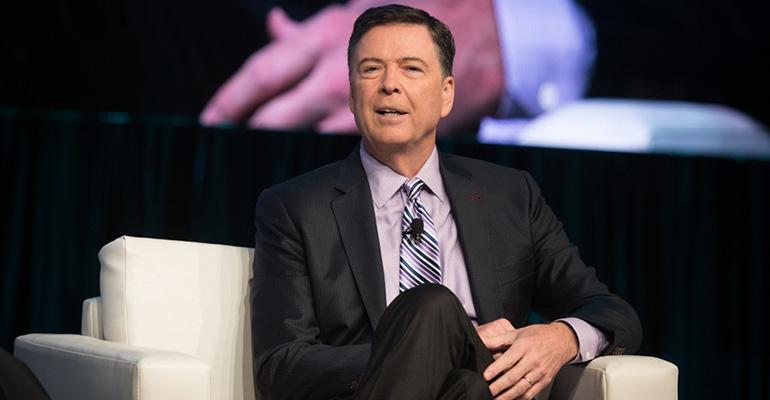James Comey, who led the FBI for four years, shared his thoughts on leadership and some things that didn’t make it into this best-selling book with advisors at BNY Mellon Pershing’s INSITE conference on Wednesday.
The former federal prosecutor and FBI director has been in and out of the spotlight for charging Martha Stewart with obstruction of justice and securities fraud, investigating Hillary Clinton for her use of a private email server and his abrupt firing by President Trump on May 9, 2017.
His memoir, A Higher Loyalty, was a huge commercial success and has garnered attention for its criticism of the Trump presidency. But Pershing Chief Relationship Officer Mike Row started their conversation by asking Comey if there was anything significant to him and his life that wasn’t already in his book, tweeted about by President Trump or well-covered by the media.
Comey said he wanted share something personal—12 years ago he was diagnosed with colorectal cancer and had received treatment, something he had never revealed to such a large audience.
“It’s a part of me I hardly ever talk about,” Comey said. “It’s very important to me and my family but I left it out of my book.”
Many conference attendees were talking about Comey as they entered the conference hall where he spoke Wednesday morning. Two attendees recalled watching his testimony before the Senate Intelligence Committee last summer. But learning about his illness seemed to humanize Comey and, perhaps, serve as a reminder that even the brightest spotlight doesn’t shine on a person in their entirety.
During the conversation with Row, Comey also shared some of his faults. “I thought I was hot stuff,” Comey said about himself at age 19. But to this day, he said he surrounds himself with people that challenge him and keep him in check.
When confidence “tips over into arrogance, it endangers you as a leader and your organization,” he said.
During his tenure as director of the FBI, Comey said he would meet with those who reported to him and their subordinates because their subordinates knew the most about specific topics that were closest to them. During those meetings, Comey said, he paid attention to see how their bosses reacted as they showed their expertise. Good leaders, he said, are those who celebrate the success of those who report to them. He didn’t want leaders who felt endangered by the success of their subordinates or a need to compete with them.
“It takes a secure leader to take joy in people’s achievements,” Comey said.
He also strived to create environments as a leader where subordinates felt they could challenge his decisions, but not without any risk. They needed to feel their arguments needed to have weight, he said.
In his book, Comey describes his days as a prosecutor going after organized crime bosses walking them through some lessons he learned about leadership from the mob. The biggest takeaway was that the organizations were “built on lies” and that he could never sympathize with the families and those he prosecuted because they are “a group of people that terrorizes innocent people.”
Although, he does like the most notorious mafia film trilogy.
“I like The Godfather, I like [The Godfather Part Two] a little better than one, and I don’t like [The Godfather Part Three] at all,” Comey said.
Comey didn’t say much about the Trump presidency that he hasn’t said already either publicly or in his memoir.
Row asked him what he thought about the length of time the ongoing investigation into Russia’s election interference, led by special counsel Robert S. Mueller, another former FBI director. President Trump has repeatedly called the investigation a “witch hunt” and claimed it is politically motivated but Comey said that is not Mueller’s intention.
“The guy is a total pro,” Comey said. “He does not give a crap about the politics.”





